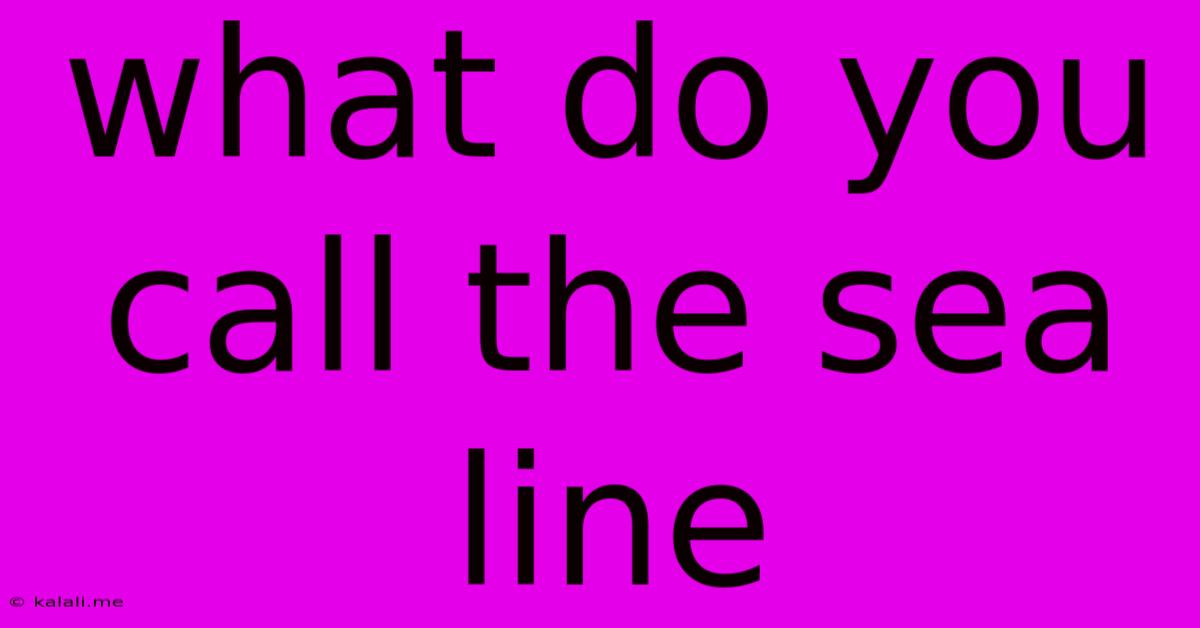What Do You Call The Sea Line
Kalali
Jun 01, 2025 · 3 min read

Table of Contents
What Do You Call the Sea Line? A Deep Dive into Coastal Terminology
The seemingly simple question, "What do you call the sea line?" reveals a surprisingly rich vocabulary depending on what aspect of the coast you're describing. There isn't one single perfect answer, as the correct term depends on the context. This article explores the various terms used to describe the boundary between land and sea, clarifying the nuances of each and helping you choose the most accurate word for your situation.
Understanding the Dynamic Nature of the Coastline
Before diving into the terminology, it's important to remember that the "sea line" is not static. Coastal regions are dynamic environments, constantly shaped by tides, waves, erosion, and human intervention. This dynamic nature affects how we describe the boundary between land and sea. Therefore, the best term depends on whether you're referring to the average high tide line, the low tide line, or a specific feature of the coast.
Key Terms for Describing the Sea Line
Here are some common terms used to describe the boundary between land and sea, each with its own specific meaning:
-
Shoreline: This is a general term referring to the boundary between land and a body of water. It's the most commonly used and widely understood term, encompassing the area affected by tides. It's a versatile term suitable for many contexts. Think of it as an overarching term covering various aspects of the coast.
-
Coastline: This term refers to the land boundary of a large body of water such as the ocean or a sea. It's a more general term than shoreline and doesn't necessarily refer to the immediate edge of the water but rather the broader coastal region.
-
High-water mark: This marks the highest point reached by the tide. This is a legally significant line in many jurisdictions, defining property boundaries and other legal rights. It's crucial for coastal management and planning.
-
Low-water mark: Conversely, this indicates the lowest point reached by the tide. Like the high-water mark, it often holds legal significance. Understanding the low-water mark is essential for navigation and charting.
-
Mean high water line (MHW): This is the average height of the high tide over a long period, usually 19 years. It's a more precise and statistically derived measure than simply observing a single high tide. This is a key term used in cartography and coastal surveying.
-
Mean low water line (MLW): Similar to MHW, this represents the average height of the low tide over a long period. It’s essential for determining the extent of tidal zones and submerged lands.
-
Beach: While not strictly a "line," the beach is the area of land adjacent to the sea, typically composed of sand or shingle, and constantly reshaped by tides and waves. The beach is a visible manifestation of the interaction between the land and sea.
Choosing the Right Term
The best term to use will depend on your specific needs:
- For general use, shoreline is usually sufficient.
- For legal or official purposes, high-water mark or mean high water line might be necessary.
- When discussing larger geographical areas, coastline is more appropriate.
- For describing the sandy area affected by tides, use beach.
Understanding these subtle differences ensures clear communication about coastal areas and avoids confusion. Whether you're writing a scientific paper, a legal document, or simply describing a coastal scene, selecting the precise terminology is crucial for accurate and effective communication. Using the correct term adds clarity and professionalism to your writing. Remember to consider your audience and the context when making your choice.
Latest Posts
Latest Posts
-
Compariosn And Contrast Of The Epic Of Gilgamesh Versions
Jun 03, 2025
-
Can You Put Cold Foam On Hot Coffee
Jun 03, 2025
-
Water Heater Condensation Drain Connection Detail
Jun 03, 2025
-
Smoke Detector Still Beeping After Changing Battery
Jun 03, 2025
-
How To Remove Mold From Caulk In Shower
Jun 03, 2025
Related Post
Thank you for visiting our website which covers about What Do You Call The Sea Line . We hope the information provided has been useful to you. Feel free to contact us if you have any questions or need further assistance. See you next time and don't miss to bookmark.